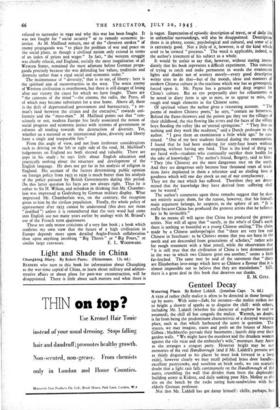Light and Shade in China
Chungking Diary. By Robert Payne. (Heinemann. 12s. 6d.) READERS who turn to this book for information about Chungking as the war-time capital of China, to learn about military and admini- strative affairs or about plans for post-war reconstruction, will be disappointed. There is little about such matters and what there is is vague. Expectation of episodic description of travel, or of daily life in unfamiliar surroundings, will also be disappointed. Description there is in plenty, scenic, psychological and cultural, and some of it is extremely good. Not a little of it, however, is of the kind which used to be termed " precious." The word is applicable, indeed, to the author's treatment of his subject as a whole.
It would be unfair to say that, however, without stating imme- diately that his book represents a difficult experiment. This consists of trying to catch and make permanent in words the evanescent lights and shades not of scenery merely—every good descriptive writer tries to do that—but of the moods, ideas and manners of modern Chinese culture in the reactions which war has so grotesquely forced upon it. Mr. Payne has a genuine and deep respect for China's culture. But an eye perpetually alert for refinements to be noted in diary form is apt to miss, or to appear to miss, the rough and tough elements in the Chinese seem!.
Of spiritual values the author gives a reassuring account. " The poems of modern Chinese poets," he says, " contain no bitterness. Behind the flame-throwers and the poison gas they see the villages of their childhood, the rice flowing like ri-rers and the faces of the village boys flooding the valley like an'eternal springtime." " They live on nothing and they work like madmen," said a Dutch professor to the author. " I gave them an examination a little while ago." he con- tinued. " One of my best students fainted during the examination. I found that he had been studying for sixty-four hours without stopping, without having any food. That is the kind of thing v,e are faced with—students who continually sacrifice their health for the sake of knowledge." The author's friend, Bergery, said to him: " They (the Chinese) are the most dangerous race on the earth. And they are dangerous only because four thousand years of tradi- tions have implanted in them a tolerance and an abiding love of goodness which will one day shock us out of our complacency. . They are the race which has suffered. Therefore they are deter- mined that the knowledge they have derived from suffering shall not be wasted."
The author's comments upon these remarks suggest that he does not entirely accept them, for the reason, however, that his friend's main argument belongs, he suspects, to the sphere of art. " It is really because China has produced the greatest artists that he believes her to be invincible."
By no means all will agree that China has produced the greatest artists. Nor will all agree that " surely, in the who"e of God's earth there is nothing so beautiful as a young Chinese smiling." The claim
• made by a Chinese anthropo!ogist that " there are very few real Chinese in Szechuan: to be Chinese means that you are born in the north and are descended from generations of scholars," rather asks for rough treatment with a blue pencil, while the observation that " it is still true that the civilisation of China is best demonstrated in the way in which two Chinese greet one another," seems a little far-fetched. The same may be said of the statement that " there are Elizabethan love-songs which have so Chinese a flavour that it is almost impossible not to believe that they are translations." Still, there is a great deal in this book that deserves our thanks.
E. M.Gut.L.


























 Previous page
Previous page